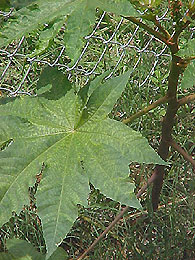Wednesday, June 30, 2004
A little scare
 I had a little scare today. Shortly after we had some soil added to our backyard not too long ago, I noticed a little plant starting to grow. As it grew, I saw that the leaves were fairly large and it looked like a plant that I've seen growing along roads and pond edges. Those plants are about 10-12 feet tall with extremely large leaves and a purplish watery-looking stem. Since I didn't know exactly what it was I decided to let it grow.
I had a little scare today. Shortly after we had some soil added to our backyard not too long ago, I noticed a little plant starting to grow. As it grew, I saw that the leaves were fairly large and it looked like a plant that I've seen growing along roads and pond edges. Those plants are about 10-12 feet tall with extremely large leaves and a purplish watery-looking stem. Since I didn't know exactly what it was I decided to let it grow.
So, not one to let a plant go unidentified, I got curious and took a picture. For some reason in the back of my mind the name castor bean kept coming to me. Why? Who knows - must be that zen thing I talk about occasionally. Anyway, I got my picture and began searching the web and sure enough that's exactly what it is. Ricinus communis is a native of Africa that will grow 15 feet tall and is considered perennial in the tropics. But, here's what scared me. The beans are poisonous to humans and animals if ingested and the sap kills bugs. Now, I'm not too concerned about the bugs but I'm sure as heck concerned about the humans and animals part. Apparently one of the main toxic proteins in the seed is ricin. One milligram of ricin can kill an adult and just one seed of this plant will kill a child. In fact, in 1978 a Bulgarian journalist was assassinated when someone gouged him with the tip of an umbrella dipped in ricin. You may think to yourself, isn't castor oil a byproduct of the castor bean? The answer is yes; however, ricin does not partition when the oil is extracted because it is water-soluable. So, while castor oil may taste like poison it's not.
After sharing all this with my husband, we both decided the best thing to do is dig it up now before it sets seed. The last thing we want on our conscience is someone or something getting its hands on a seed in our yard. Who wants to live with those consequences? Much as I dislike killing plants, this one has to go and now! To learn more about the castor bean plant, many universities have sites discussing poisonous plants. A link to Cornell is given above and here's another to Purdue. Botanical also shares some details including a letter dated 1921 about the plant's toxicity. Happy Florida Gardening and stay away from the castor beans.
Comments:
Post a Comment

This work is licensed under a Creative Commons License.
Thanks to Andrew Stenning who contributed the photograph for our masthead


